- Home
- Gerald Durrell
Menagerie Manor Page 12
Menagerie Manor Read online
Page 12
He stood about eighteen inches high and was quite the most handsome and healthy-looking baby gorilla I had ever seen.
He strolled stockily across the room towards me and then held up his arms to be lifted up. I was amazed at how heavy he was for his size, and I soon realised that this was all solid bone and muscle; there was not a spare ounce of fat on him. His light chocolate-coloured fur was thick and soft, and the skin on his hands, feet and face was soft and glossy as patent leather. His eyes were small and deep set, twinkling like chips of coal. He lay back in my arms and studied me carefully with an unwinking stare, and then lifted a fat and gentle forefinger and investigated my beard. I tickled his ribs and he wriggled about in my arms, giggling hoarsely, his eyes shining with amusement. I sat him down on a convenient table and handed him a banana which he accepted with little bear-like growlings of pleasure, and ate very daintily compared to the chimpanzees who were stuffing their mouths as full as they could. I wrote out the cheque and then we bundled N’pongo – growling protests – back into the crate, and went off to catch the plane for Jersey.
When we landed at the airport I took N’Pongo out of his crate and we drove to the Zoo with him sitting on my lap, taking a great interest in the cows we passed, and occasionally turning round so that he could peer up into my face. When we arrived I carried him up to our flat, for his cage was not quite ready and I had decided that he would have to spend a couple of days in our guest-room. His grave, courteous manner and his rather sad expression immediately won over both Jacquie and my mother, and before long he was lolling back on the sofa while they plied him with delicacies, and the staff came upstairs one by one to pay homage to him as though he was some black potentate. Having previously suffered by keeping Chumley the chimpanzee in the house, I knew from bitter experience that there was nothing like an ape for turning a civilised room into something closely resembling a bomb site in an incredibly short space of time, so I watched N’Pongo like a hawk. When he became bored with lying on the sofa, he decided to make a circuit of the room to examine anything of interest. So he walked slowly round like a small black professor in a museum, pausing now to look at a picture, now to stroke an ornament, but doing it so gently that there was never any danger that he would break anything. After the attitude I was used to with Chumley, I was captivated by N’Pongo’s beautiful behaviour. You would have thought that he had been brought up in a house, to watch him. Apart from a slight lapse when he wet the floor (and he could not be expected to know that this was not done in the best circles), his behaviour was exemplary, so much so that, by the time we put him to bed, my mother was doing her best to try to persuade me to keep him in the house permanently. I had, however, learnt my lesson with Chumley, and I turned a deaf ear to her pleas.
N’Pongo, of course, did not leave the guest-room in the condition that he found it, but this was only to be expected. Although his manners were exemplary, he was only a baby and could not be expected to automatically assume civilised behaviour, because he was living in the house. So the guest-room, when he left it, bore numerous traces of his presence: on one wall, for instance, was something that resembled a map of Japan drawn by one of the more inebriated ancient mariners. This was nicely executed in scarlet and was due to the fact that I had thought N’Pongo might like some tinned raspberries. He had liked them, and his enthusiasm at this new addition to his diet had resulted in the map of Japan. There was also straw. Next to paraffin, I know of no other commodity that manages to worm its way – in a positively parasitic fashion – into every nook and cranny before you are aware of it. For months after N’Pongo’s sojourn in our guest-room we were apologising to guests for the floor which, in spite of hoovering, looked like a sixteenth-century ale-house. There was also the fact that the handle on the door drooped at rather a depressed angle since N’Pongo, after receiving his meal, had attempted to follow me out of the room. Knowing that the handle by some magical means opened and closed the door, but not knowing exactly how to manipulate it he had merely pulled it downwards with all his strength. As I tried, unsuccessfully, to bend the handle back into position again, I reflected that N’Pongo was only about two years old and that his strength would increase in proportion to his size.
One of the things which particularly interested me about him was his different approach to a problem or a situation. If, for example, a baby chimpanzee is used to being brought out of its cage, on being reincarcerated it will carry on like one of the more loquacious heroines in a Greek tragedy, tearing its hair, rolling with rage on the floor, screaming at the top of its voice and drumming its heels on every available bit of wood-work. N’Pongo was quite otherwise. Although deploring it, he would accept the necessity of being locked up again in his cage. He would try his best to divert you from this course of action, but when he realised that it had become inevitable he would submit with good grace. His only protest would be a couple of sharp and faintly peevish screams, as he saw you disappear, whereas the average chimpanzee of his age and with his background would have gone on having hysterics for a considerable length of time. Owing to his attractive appearance and disposition, his good manners and his very well-developed sense of humour, N’Pongo was in a very short space of time the darling of the Zoo. Every fine afternoon he was brought out on to the lawn in front of the yew hedge and there he would show off to his admirers: either lolling in the grass, with a bored expression on his face, or else, with a wicked gleam in his eye, working out how he could pose for his photograph to be taken by some earnest visitor and then rush forward at the crucial moment, grasp the unfortunate person’s leg and push it from under him – a task that gave him immense amusement and generally resulted in the visitor sustaining a slipped disc and having an excellent picture of a completely empty section of lawn.
Within 12 months N’Pongo had almost doubled his size, and I felt it was now time to try, by fair means or foul, to obtain a mate for him. Unless they lack finances, I have no use for zoos that acquire animals purely for exhibition and make no effort to provide them with a mate; this applies particularly to apes. The problem does not arise while they are young, for they accept the human beings around them as their adopted, if slightly eccentric, family. Then comes the time when they are so powerful that you do not, if you have any intelligence, treat them in the same intimate way. When a gorilla or chimpanzee or an orang-utan at the age of three or four pulls your legs from under you, or jumps from a considerable height on to the back of your neck, it tests your stamina to the full and is done because you are the only companion with whom he has to play. If he is left on his own, and he is a nice-natured ape, he will try to play the same games with you when he is 11 and 12; this means a broken leg or a broken neck. So if this friendly, exuberant animal is kept on his own and deprived of both the company of his own kind and that of human beings, you can hardly be surprised if he turns into a morose and melancholy creature. Not wanting to see N’Pongo degenerate into one of those magnificent but sad and lonely anthropoids that I have seen in many zoos (including some that had ample resources at their disposal for providing a mate), I thought the time had come to try to procure a wife for N’Pongo, even though I knew that our funds would probably not stretch that far. I telephoned the dealer from whom we had N’Pongo and asked him about the possibilities of obtaining a female gorilla. He told me he had just been offered one, a year or so younger than N’Pongo, but now, owing to the political state in Africa, the price had increased and he was asking £1,500. There followed two days of soul searching. I knew we could not afford that amount of money in a lump sum, but we might be able to do it if it were spread over a period. Once again I telephoned the dealer and asked him whether he would consider letting us have the animal on hire purchase terms. To his credit and to my relief he agreed and said that his representative would bring her over to Jersey in a week’s time. The whole Zoo waited for that day with bated breath. I, prompted by a slightly acrimonious conversation with my bank manager, spent the week by having a collecting box m
ade, over which hung the notice: ‘We have bought Nandy on the instalment plan, please help us to keep up the instalments.’
So Nandy arrived, crouched in a crate that I would have considered small for a squirrel. She, like N’Pongo, appeared to be in perfect condition: her fur was glossy, she was fat, and her skin had a sheen like satin, but at first sight of her it was her eyes that impressed me most. N’Pongo’s eyes, as I have said, were small and deep-set, calculating and full of humour. Nandy’s eyes were large and lustrous, and when she looked sideways, she showed the whites of them; but they were frightened eyes that did not look at you squarely. They were the eyes of an animal that had had little experience of human beings, but even that limited experience had given her no reason to trust or respect them. When we released her from her cage, I could see the reason: right across the top of her skull was a scar which must have measured six or seven inches in length. Obviously, when she was being caught, some over-enthusiastic and intrepid human being had given her a blow with a machete which had split her scalp like a razor slash. It must have been a glancing blow, or else her skull would have been split in two. With such an introduction to the human race, you could hardly blame Nandy for being a little antisocial. This great slash was by now completely healed and there was only the long white scar to be seen through the hair of her head, which reminded me of the curious imitative and quite unnecessary partings that so many Africans carve in their hair with the aid of a razor.
We kept Nandy in a separate cage for 24 hours, so that she could settle down. The cage was next to N’Pongo’s, to enable her to see her future husband, but she evinced as little interest in him as she evinced in us. If you tried to talk to her and looked directly at her face, her eyes would slide from side to side, only meeting yours for a sufficient length of time to judge what your next action might be. Eventually deciding that the wire between us rendered us comparatively harmless, and rather than look at us, she turned her back. She had such a woebegone, frightened face that one longed to be able to pick her up and comfort her, but she had been too deeply hurt, and this was the last thing she would have appreciated. It would take us, I reckoned roughly, at least six months to gain her confidence, even with the example of the pro-human N’Pongo.
The morning when we let her into the cage with N’Pongo was a red-letter day, but fraught with anxiety. He had by now become so well established and was such a fearfully extroverted character that he obviously considered he was the only gorilla in the world and that all human beings were his friends. We did not know how he would react to Nandy’s sullenness and anti-human attitude. Although for 24 hours he could see her in the cage alongside him, he had shown absolutely no interest in her presence. Thus when the great moment of introduction came, we stood by with buckets of water, brushes, nets and long sticks, just in case the engagement party did not come off with the same romantic swing that one expects from reading women’s magazines. When all was ready, we opened the shutters and Nandy, looking thoroughly distrustful, sidled her way from the small cage into N’Pongo’s comparatively palatial quarters. There she put her back to the wall and squatted, her eyes darting to and fro with a curiously suspicious, yet belligerent, expression on her face. Now she was actually in the cage with N’Pongo, who was sitting up on a branch, watching her with the same expression of uninterested mistrust that he reserved for some new item of diet, we could see that she was very much smaller than he – in fact only about half his size. They sat steadily contemplating each other for some minutes, while we on the other side of the wire did hasty checks to make sure that all our buckets of water, nets, sticks and so on were easily accessible.
This was the critical moment: the two gorillas and ourselves were frozen into immobility. To any spectator, who did not know the circumstances, we would have appeared like one of the more bizarre of Madame Tussaud’s exhibits. Then N’Pongo stretched out a black hand with fingers the size of chipolata sausages, clasped the wire and rolled himself carefully to the ground. There he paused and examined a handful of sawdust, as though it were the first time he had ever come across such a commodity. Then, in a casual, swaggering manner, he sauntered in a semicircle which took him close to Nandy, and then, without looking at her, but with the utmost speed, he reached out a long, powerful arm, gripped a handful of her hair and pulled it, and then hurried along the perimeter of the cage as though nothing had happened. Nandy by nature has always been – and I fear will always be – a little slow in the uptake, and so N’Pongo was some six feet away before she realised what had happened. By then the baring of her teeth and her grunt of indignation were quite useless. The first round, therefore, went to N’Pongo, but before he could get exalted views of male superiority I felt that we should bring up our second line of defence. We removed the buckets and nets and produced two large dishes full of a succulent selection of fruits. One was presented to N’Pongo and one to Nandy. There was one slight moment of tension when N’Pongo, having examined his own plate, decided that possibly Nandy’s contained additional delicacies, which his lacked, and went off to investigate. Nandy, however, was still smarting under the indignity of having had her hair pulled and she greeted N’Pongo’s investigation of her plate with such a display of belligerence that N’Pongo, being essentially a good humoured and cowardly creature, retreated to his own pile of food. For the next half an hour they both fed contentedly at opposite ends of the cage. That night N’Pongo, as usual, slept on his wooden shelf, while Nandy, looking like a thwarted suffragette, curled up on the floor. All through the following day they had little jousts with each other to see who would occupy what position. They were working out their own protocol; should Nandy be allowed to swing on the rope when N’Pongo was sitting on the cross beam? Should N’Pongo be allowed to pinch Nandy’s carrots even though they were smaller than his own? It had the childishness of a General Election but was three times as interesting. However, by that evening, Nandy had achieved what amounted to Votes for Female Gorillas, and both she and N’Pongo shared the wooden shelf. Judging by the way N’Pongo snuggled up to her, he was not at all averse to this invasion of his bedroom.
It was obvious from the first that the marriage of the gorillas was going to be a success. Although they were so different in character, they quite plainly adored one another. N’Pongo was the great giggling clown of the pair, while Nandy was much quieter, more introspective and watchful. N’Pongo’s bullying and teasing of her was all done without any malice and out of a pure sense of fun, and this Nandy seemed to realise. Occasionally, however, his good humoured teasing would drive her to distraction: it must have been rather like being married to a professional practical joker. When she reached the limit of her endurance, she would lose her temper, and with flashing eyes and open mouth would chase him round the cage while he ran before her, giggling hysterically. If she caught him, she would belabour him with her fists while N’Pongo lay on the ground curled up in a ball. Nandy might just as well have tried to hurt a lump of cement – in spite of her strength – for he would just lie there, laughing to himself, his eyes shining with good humour. As soon as she tired of trying to make some impression on his muscular body, Nandy would stalk off to the other end of the cage, and N’Pongo would sit up, brush the sawdust from himself, beat a rapid tattoo of triumph on his breast or stomach and then sit there with his arms folded, his eyes glittering, working out what other trick he could play to annoy his wife.
To have acquired such a pair of rare and valuable animals was, I considered, something of an achievement, but now, I discovered, we were to live in a constant state of anxiety over their health and well-being: every time one of them got sawdust up its nose and sneezed, we viewed this with alarm and despondency – was it a prelude to pneumonia or something worse? The functioning of their bowels became a daily topic of conversation. I had had installed a magnificent communication apparatus in the Zoo, for, small though it was, it could take a considerable length of time to locate the person required at the moment you wanted him.
‘Mr Durrell, the gorillas have got diarrhoea again.’
I know of no equal to this remark for putting a blight on a party. However, N’Pongo and Nandy grew apace, and to our intense relief developed none of the diseases that we feared they might contract.
Then came N’Pongo’s first real illness. I had just arranged to spend three weeks in the South of France, which was to be a sort of working holiday, for we were to be accompanied by a BBC producer whom I hoped to convince of the necessity for making a film about life in the Camargue. Hotels had been booked, numbers of people, ranging from bull-fighters to ornithologists, had been alerted for our coming, and everything seemed to be running smoothly. Then four days before we were due to depart, N’Pongo started to look off colour. Gone was his giggling exuberance; he lay on the floor or on the shelf, his arms wrapped round himself, staring into space, and only just taking enough food and milk to keep himself alive. The only symptom was acute diarrhoea. Tests were hurriedly made and the advice of both the vet and medical profession acted upon, but what he was suffering from remained a mystery. As with all apes, he lost weight with horrifying rapidity. On the second day he stopped eating altogether and even refused to drink his milk, so this meant we could administer no antibiotic. Almost as you watched, his face seemed to shrink and shrivel and his powerful body grow gaunt. What had once been a proudly rotund paunch now became a ghastly declivity where his ribs forked. Now his diarrhoea was quite heavily tinged with blood and at this symptom I think most of us gave up hope. We felt that if he would only eat something, it might at least give him some stamina to withstand whatever disease he was suffering from, as well as rouse him out of the terrible melancholia into which he was slipping, as most of the anthropoids do when they are ill.

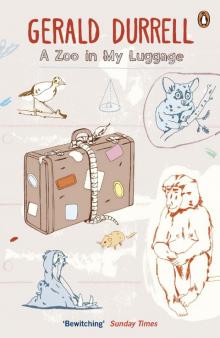 A Zoo in My Luggage
A Zoo in My Luggage The New Noah
The New Noah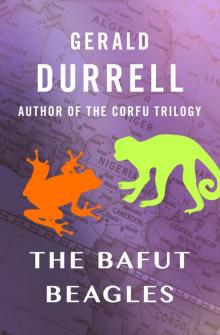 The Bafut Beagles
The Bafut Beagles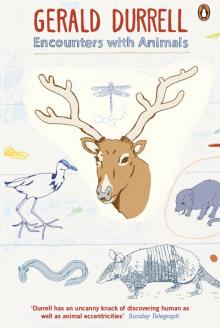 Encounters With Animals
Encounters With Animals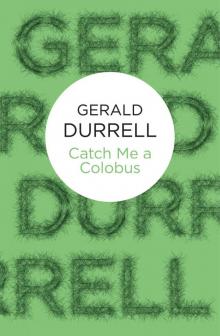 Catch Me a Colobus
Catch Me a Colobus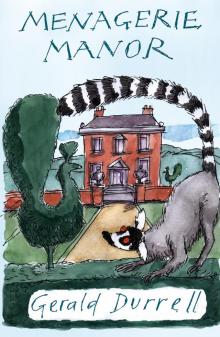 Menagerie Manor
Menagerie Manor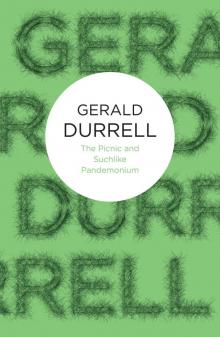 The Picnic and Suchlike Pandemonium
The Picnic and Suchlike Pandemonium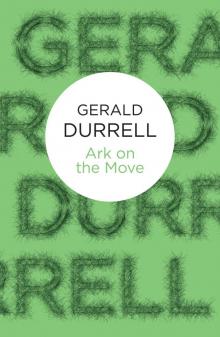 Ark on the Move
Ark on the Move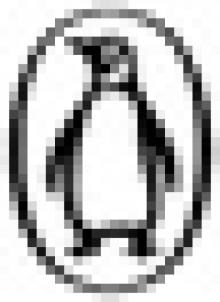 My Family and Other Animals
My Family and Other Animals Two in the Bush (Bello)
Two in the Bush (Bello) The Stationary Ark
The Stationary Ark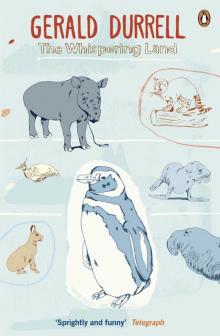 The Whispering Land
The Whispering Land Three Singles to Adventure
Three Singles to Adventure Fillets of Plaice
Fillets of Plaice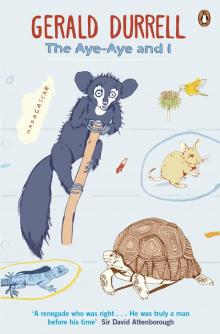 The Aye-Aye and I
The Aye-Aye and I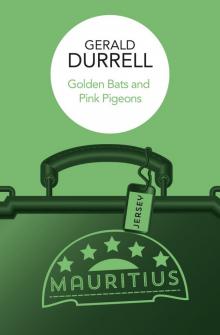 Golden Bats & Pink Pigeons
Golden Bats & Pink Pigeons The Drunken Forest
The Drunken Forest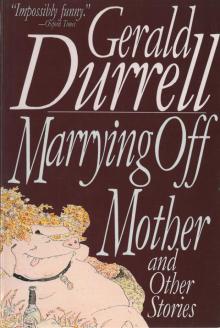 Marrying Off Mother: And Other Stories
Marrying Off Mother: And Other Stories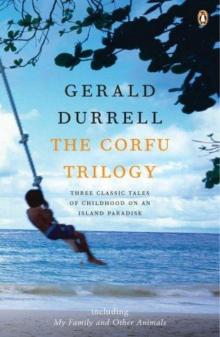 The Corfu Trilogy (the corfu trilogy)
The Corfu Trilogy (the corfu trilogy)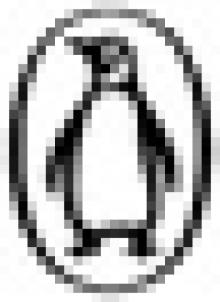 The Corfu Trilogy
The Corfu Trilogy Marrying Off Mother
Marrying Off Mother Two in the Bush
Two in the Bush